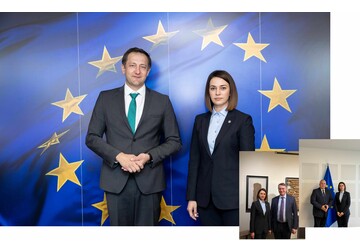
Moldova asks the EU for a transitional period to adapt its agricultural sector to European norms and for financial resources for reforms
This was announced by Agriculture and Food Minister Ludmila Catlabuga during high-level meetings in Brussels with European Commission representatives from the Directorate General for Agriculture and Rural Development (DG AGRI), the Directorate General for Enlargement and Eastern Neighborhood (DG ENEST), the Directorate General for Maritime Affairs and Fisheries (DG MARE), as well as representatives of the European Parliament. The goal of her visit to Brussels is to consolidate the partnership with the European Union in order to support Moldovan farmers and promote the reforms needed for the European integration of the agri-food sector. Ludmila Catlabuga spoke about the reforms already launched in the agri-food sector, noting that the Ministry carried out an internal reorganization to ensure better institutional coordination. A new legislative framework for financing and management of agricultural policies has been proposed, which will allow for efficient utilization of funds. Another achievement, she said, is the completion of the Strategic Program of Agricultural Policy for 2025-2030, which will guide the development of agriculture in the coming years. Laws on Agricultural Chambers and the Network for Collection of Accounting Information on Income and Economic Activities of Agricultural Enterprises were also passed. The Ministry has also initiated the development of the Integrated Administration and Control System (IACS), an essential subsidy management mechanism to ensure traceability of government intervention in agriculture, increase transparency in the distribution of funds and facilitate farmers' access to financial assistance. Other challenges relate to the development of the Agricultural Knowledge and Innovation System (AKIS), aimed at strengthening the capacity of farmers to access markets and necessary financing. In addition, the Agency for Intervention and Payments in Agriculture (AIPA) is planned to be harmonized with European requirements, as well as to expand the functionality of the National Register of Farmers. In parallel, there is a pilot stage of implementation of the Land and Plot Identification System - a tool that will allow better management of resources and taking measures in agriculture. As noted by the head of the Ministry of Agriculture, the development of the rural environment is another priority, which aims to cover at least 70% of the country's territory through LEADER strategies and annually support more than 500 rural development projects through the National Fund for Agricultural and Rural Development. The reform program also includes the commissioning of 4 regional laboratories for official control and testing, as well as modernization of sample transportation logistics between border points and laboratories. Besides, Ludmila Catlabuga reiterated a number of appeals to the European partners. One of them is Moldova's inclusion in the EU Program for Schools, which allows distributing fruits, vegetables and milk in educational institutions. Another topic touched upon was Moldova's request to benefit from transitional periods to adapt the agricultural sector to the European norms. “These periods will allow for a more balanced implementation of the new requirements regarding food safety, support for farmers and quality standards. At the same time, we express interest in accessing funding to prepare for accession, especially through the IPARD program, and request support in preparing the structure needed to absorb these resources,” said Ludmila Catlabuga. // 28.03.2025 - InfoMarket







